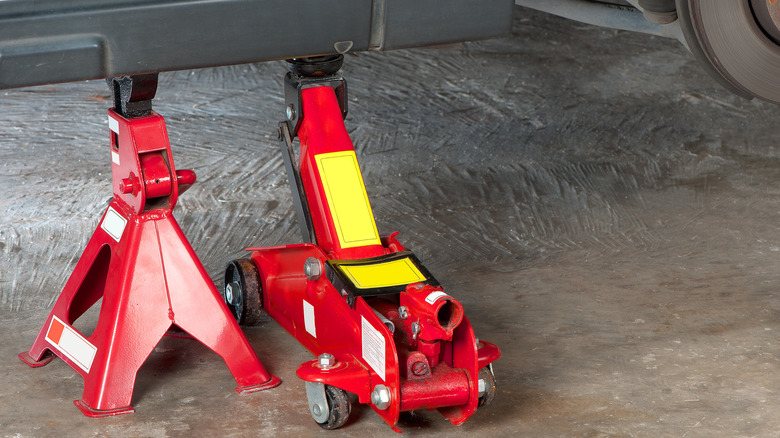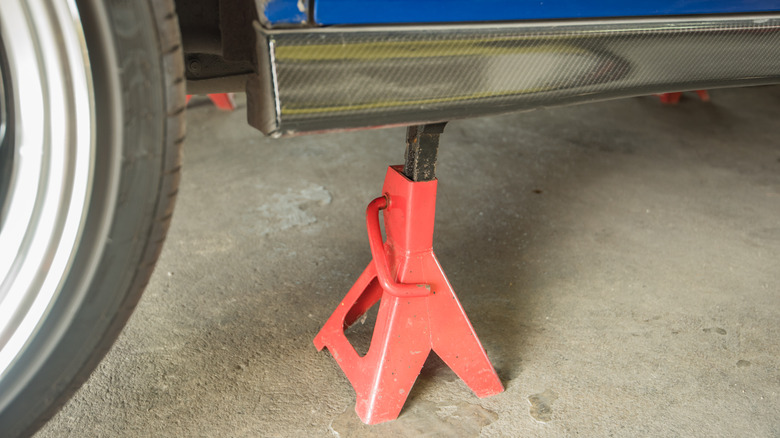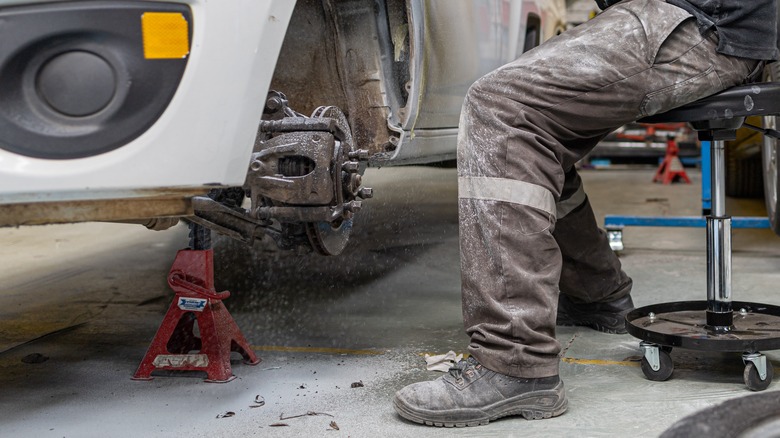Can You Go Cheap With Jack Stands? Or Is It A Disaster Waiting To Happen?
Floor jacks are an essential tool for getting a vehicle off the ground for the sake of repairs, maintenance, and so on. That said, the second most essential tool for vehicle elevation behind floor jacks is a jack stand (or really a pair of jack stands).
While floor jacks may raise the vehicle, the stands are your best bet for actually keeping it in position. Using them also means you don't have to rely on the jack itself to hold up all that weight for an extended period of time, which is an extremely unsafe practice. You should lift with the jack, get the stands in place, then remove the jack before you start any work.
Like most hardware you'll find in a garage, jack stands are available at a variety of price points. You might be tempted to assume that the more expensive the jack stand, the better the quality — and when comparing top-tier brands to budget lines, that's more or less accurate — but a less pricey option doesn't always mean an inferior product (and vice-versa).
What to consider in jack stands
The main factors you want to think about when looking for jack stands (in any price range) are the construction and the engineering. Due to physics — fulcrums, tipping points, etc. — the size of a jack stand's base and the height you use the stand at are both very important when it comes to stability. The higher the jack stand holds the vehicle, the less effective the base will be at keeping the stand from tipping under pressure or sudden movements. Hence why it's better to have a wider base as well.
You should also look for jack stands with a flatter base (as opposed to one that sits on the edge of its own frame) if you expect to ever use it on asphalt. Warm asphalt tends to be softer than cold, and the narrower the point all that vehicle weight is being pushed onto, the more likely the jack stand feet are to start sinking in. Which, in turn, can make stands uneven and far less stable.
Weight limits are also a big deal, but you don't have to worry too much about a low-cost stand not living up to its advertised potential. Barring something like a factory defect, if a pair of stands claim they can hold up to 3,000 pounds, they should be good for up to 3,000 pounds. Just be sure you know how much weight they'll be working with beforehand.
Cheap versus expensive stands
As with most products we buy — from clothing and electronics, to food and tools — you almost always get what you pay for. Although, this isn't necessarily a guarantee in all cases. Expensive products are sometimes shoddy, and inexpensive options are occasionally very well made for the price. In the case of jack stands, there's generally a bit of variance until you reach higher price points (like around $200 or more).
There are some jack stands that sell for less than half of what you'd pay for a high-end model that can hold up relatively well. Project Farm tested several cheaper jack stand options — priced from around $30 to roughly $80, along with one $220+ high-end model — across a number of criteria to see just how wide the gulf in quality is between them all. As it turns out, while the most expensive jack stands did come out on top, several of the more affordable competitors between $35 and $80 also performed quite well.
The test indicates that you probably can't go wrong with using an expensive set of jack stands, but a cheaper set isn't necessarily a massive step down either. Ultimately, if you're in the market and are working on a tight budget, it's highly recommended that you do thorough research on the stands you want before you trust them to hold up thousands of pounds worth of car or truck.


